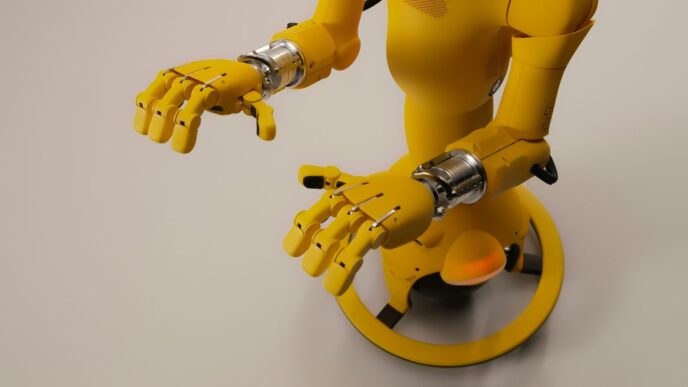Thinking about your health can be a bit much sometimes, right? You get a weird symptom, and suddenly you’re deep down a rabbit hole of online searches, trying to figure out what’s going on. It’s easy to get overwhelmed or, worse, ignore it. That’s where tools like Ada Health AI come into play. This isn’t just another health app; it’s designed to make understanding your health a lot simpler and more personal. Let’s look at how Ada Health AI is changing the game for personal health assessments.
Key Takeaways
- Ada Health AI offers a personalized way to check symptoms, asking questions that fit your situation to get a clearer picture.
- The tool explains medical terms in simple language, helping you understand your health better and make smarter choices.
- Ada Health AI can follow up with you, checking how things are going and adjusting advice, which is pretty neat.
- This technology is making health assessments more accessible, especially for people who might have trouble seeing a doctor regularly.
- With significant funding, Ada Health AI is growing its services, aiming to help more people and healthcare systems worldwide.
Ada Health AI: Transforming Personal Health
Ada Health AI is really changing how we think about checking our health. It’s like having a knowledgeable guide right in your pocket, ready to help you understand what might be going on when you don’t feel quite right. This isn’t just about asking a few questions; it’s a whole system designed to make health assessments more accessible and understandable for everyone.
Revolutionizing Symptom Assessment
Forget those endless hours spent scrolling through medical websites, trying to figure out what that weird rash or persistent cough might mean. Ada Health AI steps in with a smart approach. It asks you a series of questions, much like a doctor would, but it does so in a way that’s easy to follow. The system is built to get to the heart of the matter quickly.
- Personalized questioning: Ada doesn’t just ask generic questions. It adapts based on your answers, digging deeper into specific symptoms to get a clearer picture.
- Clear language: Medical jargon can be confusing. Ada explains things in plain terms, so you actually understand what it’s asking and what the potential outcomes might be.
- Speed and efficiency: What might take a doctor several minutes to gather, Ada can often do in a fraction of the time, providing a preliminary assessment.
Empowering Informed Health Decisions
Knowing what’s going on with your health is the first step to taking care of it. Ada Health AI gives you information that helps you make better choices about your next steps. It’s not about replacing doctors, but about giving you a starting point.
- Understanding possibilities: After you answer the questions, Ada can suggest possible conditions that match your symptoms. This helps you know what to discuss with a healthcare professional.
- Guidance on next steps: Based on the assessment, Ada can advise whether you should see a doctor, go to an emergency room, or if self-care might be appropriate.
- Building health knowledge: By interacting with Ada, users often learn more about different symptoms and conditions, which can lead to better overall health awareness.
Global Impact and User Trust
Ada Health AI has already made a significant mark, helping millions of people around the world get a better handle on their health concerns. Its focus on accuracy and user-friendliness has built a strong foundation of trust.
| Feature | Description |
|---|---|
| User Base | Millions of users worldwide |
| Primary Function | Symptom assessment and health guidance |
| Key Benefit | Increased accessibility to preliminary health information and decision support |
This widespread adoption shows that people are looking for accessible ways to understand their health, and Ada Health AI is stepping up to meet that need. It’s a tool that puts more health knowledge directly into the hands of individuals, making personal health management feel less daunting.
The Technology Behind Ada Health AI
Ada Health’s approach to personal health assessment is built on some pretty smart tech. It’s not just a simple Q&A; it’s designed to feel like a real conversation, but one that’s incredibly efficient and focused on getting you the right information.
Personalized Questioning for Accuracy
When you start using Ada, it doesn’t just ask a generic list of questions. Instead, the AI tailors its questions based on what you’ve already told it. Think of it like a doctor asking follow-up questions – if you mention a headache, it might then ask about the location, intensity, or any other symptoms you’re experiencing. This dynamic questioning process, which considers your age, gender, and any past medical history you provide, helps Ada gather the most relevant details. This personalized approach is key to making the assessment as accurate as possible. It means you’re not wasting time answering questions that don’t apply to your situation.
Layman’s Terms for Clear Understanding
One of the biggest hurdles in healthcare is understanding medical jargon. Ada really shines here. If the AI uses a term you might not know, it explains it in simple, everyday language. This makes the whole process much less intimidating and helps you actually understand what’s going on with your health. It’s like having a friendly guide who breaks down complex medical ideas so they make sense. This focus on clear communication helps build confidence and makes you feel more in control of your health journey.
Intelligent Follow-Up Capabilities
Ada doesn’t just give you an assessment and send you on your way. It has this neat feature where it can check in with you later. This means it can track how your symptoms are changing over time and adjust its advice if needed. So, if you’re feeling a bit better or worse, Ada can take that new information into account. This ongoing support is pretty unique and helps make sure you’re getting the right guidance throughout your experience, not just at the initial point of contact.
Advancements in AI Healthcare Chatbots
AI healthcare chatbots are really changing how we think about getting health advice. It’s not just about asking a question and getting an answer anymore. These tools are getting smarter, learning to do more than just basic symptom checking.
Predictive Analytics for Proactive Care
One of the big leaps forward is using predictive analytics. Think of it like this: instead of just reacting to your symptoms, these chatbots can start to guess what health issues you might face down the road. By looking at patterns in your health data, maybe from your wearable devices or past interactions, they can flag potential problems before they become serious. It’s like having a health assistant that can see trouble coming.
Tailored Responses Through Personalization
Another area where chatbots are really stepping up is personalization. The chatbots of the future won’t give everyone the same generic advice. They’ll be able to tailor their responses based on your specific health history, your preferences, and even how you’re feeling on a particular day. Imagine talking to a chatbot that feels like a trusted advisor who actually knows you and your health background. This makes the advice much more relevant and helpful.
Integrating Wearable Device Insights
We’re also seeing chatbots get much better at working with information from our smartwatches and fitness trackers. This means they can take in data like your heart rate, sleep patterns, and activity levels.
Here’s a look at how this integration works:
- Data Collection: Wearables gather continuous health metrics.
- AI Analysis: Chatbots process this data to identify trends or anomalies.
- Personalized Feedback: The chatbot provides insights based on your unique data.
This connection between what your wearable tracks and what the chatbot understands can lead to a much more complete picture of your health, allowing for more accurate and proactive health guidance.
Benefits of Ada Health AI in Healthcare
Ada Health AI really changes how people get health information, making it way easier for everyone to understand what’s going on with their bodies. It’s not just about checking symptoms; it’s about making healthcare more accessible and less of a headache for the whole system.
Improving Accessibility to Health Assessments
Think about it: not everyone can just pop into a doctor’s office whenever they feel a bit off. Ada Health AI is there 24/7, right on your phone. This means if you’re in a remote area, have trouble getting around, or just can’t get an appointment quickly, you can still get some solid guidance. It’s like having a health advisor in your pocket, ready whenever you need it. This kind of constant availability helps bridge gaps in care that have been around for ages.
Reducing Strain on Healthcare Systems
Doctors and nurses are often swamped with patients, many of whom might just need a little reassurance or help figuring out if they should see someone. Ada Health AI can handle a lot of these initial checks. By asking smart questions and giving clear advice, it can help sort out what’s urgent and what’s not. This means healthcare professionals can spend more time with people who truly need their hands-on attention, rather than getting bogged down with routine questions. It’s a smart way to use resources better.
Facilitating Early Detection of Conditions
One of the really cool things Ada Health AI does is its ability to spot potential problems early. Because it asks detailed questions and can track how symptoms change over time, it might pick up on patterns that suggest a more serious issue is developing. Getting ahead of a health problem can make a huge difference in how it’s treated and the outcome. This proactive approach means people can get the right care sooner, which is always better than waiting until things get worse.
Funding and Future Growth for Ada Health
Securing Significant Investment
Ada Health has recently brought in a substantial $120 million in new funding. This big financial boost is a clear sign that investors see the massive potential in what Ada is doing. It’s not just about having a cool app; it’s about fundamentally changing how people approach their health. This money will be used to push the company forward, making its technology even better and reaching more people.
Enhancing Enterprise Solutions
Beyond just the app for individuals, Ada is also working on solutions for bigger organizations like hospitals, insurance companies, and even governments. This funding will help them improve these business-to-business tools. Think about making it easier for a hospital to quickly figure out which patients need urgent care or helping an insurance company manage health information more efficiently. They’re building on their success to offer these advanced systems.
Expanding Global Reach and Partnerships
With this new capital, Ada plans to grow its presence worldwide. They’re looking to team up with more healthcare providers and organizations in different countries. The goal is to make their smart health assessment tools available to as many people as possible, no matter where they live. This expansion is key to their mission of improving health literacy and access to care on a global scale. It’s about building a network where their technology can make a real difference.
The Role of Ada Health AI in Patient Care
Ada Health AI really changes how people interact with their health. It’s not just about checking symptoms; it’s about making sure you get to the right place for care, understand what’s going on with your body, and ultimately, spend less money on healthcare that wasn’t really needed.
Guiding Patients to Appropriate Care
Think of Ada as a helpful guide. When you tell it your symptoms, it asks smart follow-up questions. This isn’t random; the questions are based on what you’ve already said, your age, and other personal details. This personalized approach helps Ada figure out the best next step for you. Is it something you can manage at home? Do you need to see a doctor soon? Or is it something that needs immediate attention at an emergency room? Ada helps sort this out, so you don’t have to guess. It’s like having a knowledgeable assistant who knows when to point you towards a specialist and when a quick chat with your GP will do.
Enhancing Health Literacy
Sometimes, medical terms can be confusing. Ada is really good at explaining things in simple language. If it mentions a condition or a symptom you’re not familiar with, it breaks it down so you can actually understand it. This makes you more aware of your own health. When you understand what’s happening, you can make better choices about your well-being and what kind of medical help you might need. It’s about giving people the knowledge to be more in charge of their health journey.
Reducing Avoidable Healthcare Costs
By guiding people to the right level of care from the start, Ada can help cut down on unnecessary doctor visits or emergency room trips. If your symptoms can be managed with advice from the app, or if you just need to schedule a regular appointment instead of rushing to the ER, that saves everyone time and money. It means healthcare resources are used more efficiently, and patients don’t end up paying for care they didn’t really need. It’s a win-win for both individuals and the healthcare system.
Looking Ahead
Ada Health has really shown us how AI can make personal health checks much easier to understand and use. Millions of people have already used their app to figure out what might be going on with their health, and many say it’s super helpful and simple to use. This kind of technology is changing how we think about healthcare, making it more available and helping doctors focus on the people who need them most. As AI gets even smarter, we can expect tools like Ada to become even better at helping us manage our health, maybe even predicting problems before they start. It’s pretty exciting to think that getting good health advice might soon be as easy as having a chat.












